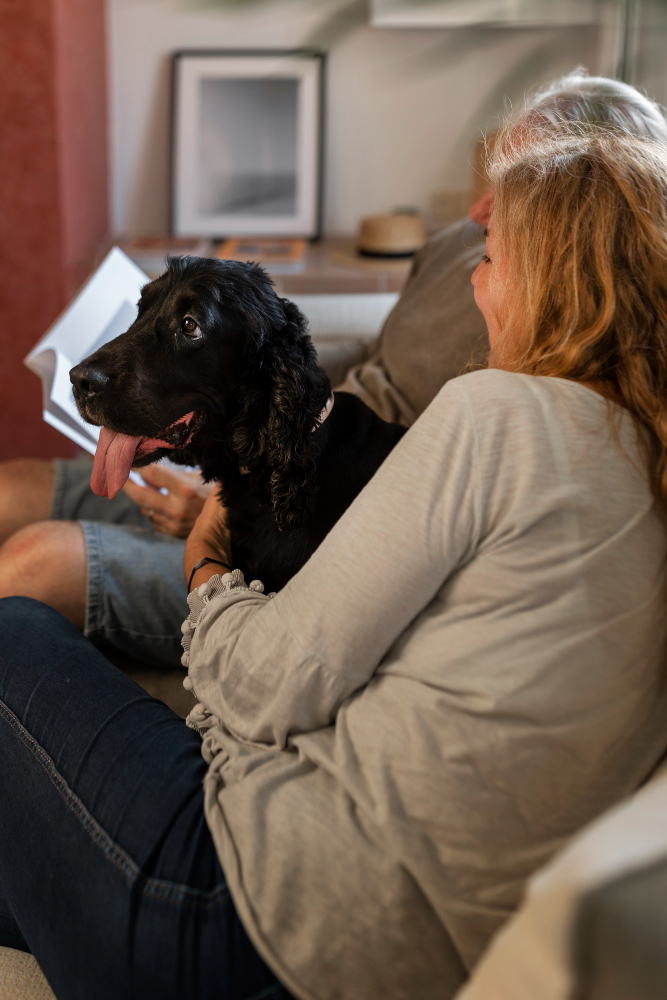CARING FOR A SENIOR PET
I love caring for my older dogs; it’s one of my biggest joys. I’ve known how charming senior dogs maybe since I was a little child since my grandma dubbed older animals with silvery fur faces “sugar faces.” The lovely dog you see in the picture is a foster hospice dog that my coworker Dana adopted into her heart and home. I now have three senior dogs of my own, including one who is a foster and two senior cats. Yes, kittens and puppies are attractive, but older pets have a massive edge over younger ones. Of course, all that knowledge comes through, but I’d be remiss if I didn’t point out that they occasionally also have a healthy dose of stubbornness and selective hearing. I’ve only had senior pets for a while, so I’m still learning how to take the best possible care of them. Fortunately, I work in animal welfare and can benefit from all of my coworkers’ decades of knowledge. Here are some lessons I’ve learned about taking care of senior pets that I hope will be useful to you if you’re getting ready to take care of a senior pet of your own, whether it’s a new addition you’re adopting (old pet adopters rock!) or an adult pet you’re looking forward to taking care of as they ages.
- Take things slower
My giant dog, Max, used to be a ball of excitement. He would drag me around my neighbourhood on rollerblades while working hard to complete the task at hand quickly. He recently turned 12 and is currently spending more time napping and less time wishing to go for a run. (I’ve been anticipating that for around ten years!) With each passing year, our rollerblading sessions became shorter and slower. Last year, we progressed to jogging, and this year, to walking, with frequent sniffing pauses.
Primarily if they are engaged in enjoyable activities like chasing a ball or going on a trip or run, many dogs are highly stoic and disregard discomfort. As they age, their humans (we) must restrict their strenuous physical activity while providing them with lots of outlets for their energy.

- Keep life interesting
Although Max is no longer tugging me when I am skating, his canine brain still longs for the thrill of the chase. (I have a suspicion that he has some sight-hound ancestry.) So we instead choose to drive. The rear seat window of my car has a pull-up window screen, so when I roll it down, he can take huge, delighted sniffs of all the beautiful fragrances that are blowing past while we drive to the market or are simply out for a 10-minute joy trip.
Is your dog a new toy lover? Especially when you pull them out of the wrinkled bag or wrapper when you get home. If you can, try to offer your senior dog one new toy each week from your budget for new toys. A new tennis ball, a plastic water bottle with some chow inside, or a tug toy created from a knotted t-shirt are just a few examples of free DIY dog toys.
- Senior TLC
Senior animals may require or enjoy a little extra care. For example, suppose you want your sugar-faced companion to get up on the bed or sofa with you comfortably without running the risk of making a dangerously significant jump up or down. In that case, you may need to offer stairs. Your vet may want to visit them every six months rather than once a year for a check-up. Even if they have previously been trained to be off-leash, you may want to take extra precautions with dogs because of their limited senses of sight and hearing. A gentle daily massage with a bit more purpose than a lovely petting session is an excellent additional method to show your elderly friend some love.
- Adopt a younger friend?
This is a highly significant choice that deserves careful consideration. Social pets occasionally benefit from and brighten up with younger friends as they age. Others, especially those who have lived with you as your only pet, are much happy soaking in all of your attention rather than sharing it. In addition, a senior pet’s health can be significantly improved by increasing their exercise level (and enjoyment!). But are you sure you’re adopting that young puppy or kitten for your elderly pet, or are you adopting it yourself? If you’re an older adult with arthritis, you could appreciate spending time playing with a baby. However, you would instead be taking peaceful naps in your recliner than being a chew toy or getting pounced on. As an alternative, consider getting your older pet a young adult partner. Afterwards, you and your elderly pet can benefit from youthful vitality without overexposure.


